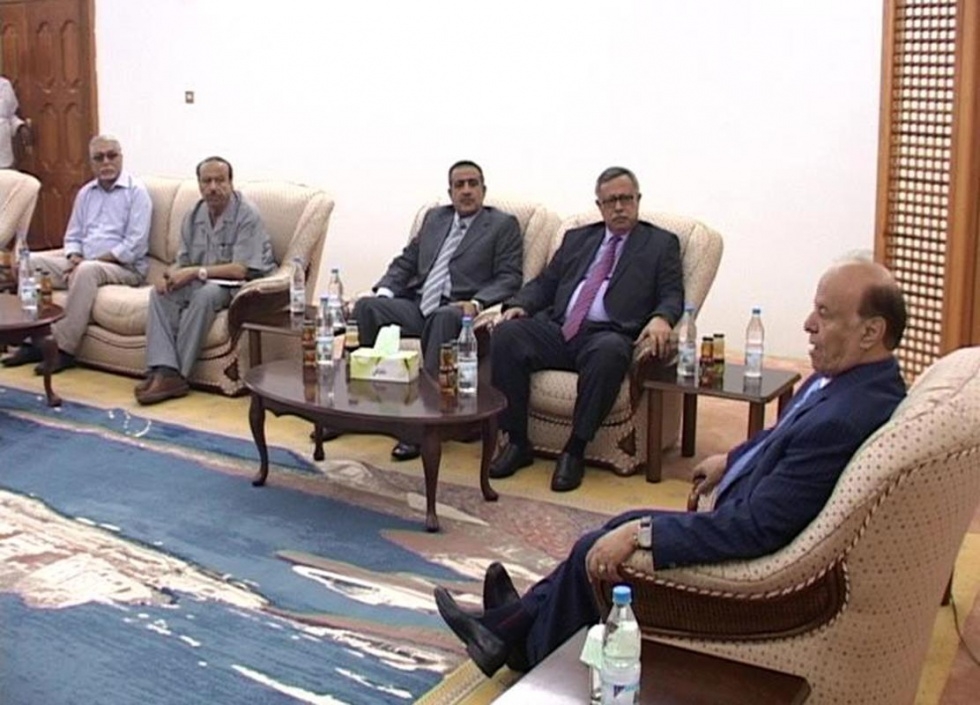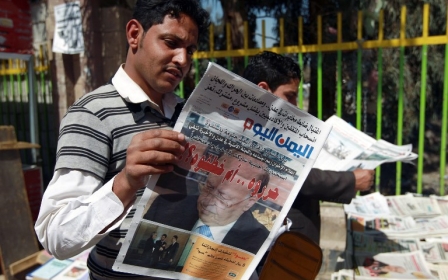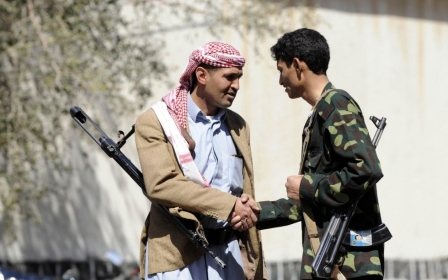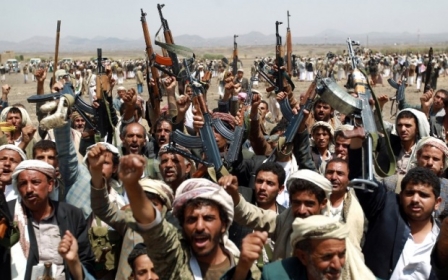Yemen's Hadi meets with country's governors in Aden

Deposed Yemeni president Abd Rabbuh Mansour Hadi met in Aden on Monday with governors from the country’s northern and southern provinces, a presidential source said.
The meeting with governors from Hadramaut, Taiz, Ibb, Marib, Shabwaj and al-Mahrah provinces came days after the Yemeni leader, who hails from the south, escaped to Aden from Sanaa and released a statement insisting that he is still Yemen’s legitimate president.
During Monday's meeting, Hadi reportedly backed a Gulf initiative to solve Yemen’s political crisis and called for the current national dialogue to be transferred from the Houthi-controlled Sanaa to a different location in another city.
This is the first meeting between Hadi and governors from the north since his dramatic Friday night escape from the capital where he had been under house arrest for weeks by the Houthi militant group. Hadi is now residing in a presidential residence in the Khormaksar diplomatic district in Aden.
Speaking ahead of the meeting, the source, who requested anonymity, told the Anadolu Agency that it would “touch on the latest developments in Yemen especially after the president left his house in Sanaa to Aden on Saturday”.
The get-together would also tackle means of imposing “security” in the provinces that are not under the Houthis’ control, he added.
On Sunday, Hadi met with the governors of the southern provinces of Aden, Ad Dali, Lahej, Abin and Socotra. Nasser al-Tahri, who leads a key southern military base, also attended the Sunday meeting.
“The president will keep up his political efforts to lead from Aden,” Abdulaziz bin Habtoor, Aden’s governor, told reporters.
“His priority is to normalise the security situation in Aden in order to receive foreign delegates who have requested appointments to meet him,” Habtoor said.
Hadi’s nephew Nasser Ahmed Mansour Hadi was abducted by Houthi militiamen on Saturday as he tried to leave Sanaa to join his uncle.
A presidential source who attended the meeting said that Hadi had received calls from several Arab leaders who all voiced support for his presidential legitimacy.
Hadi had said all decisions taken by the Shiite Houthi group since 21 September 2014 were “null” and “illegitimate".
The Yemeni leader tendered his resignation to the parliament last month after the Houthis seized control of Sanaa’s presidential compound, following clashes with presidential guards. Yet the parliament has failed to convene to decide on the resignation.
Jamal Benomar, the UN envoy to Yemen, said that Hadi had reassured him over a telephone call that he still supported dialogue to end the crisis, but called for the talks to be moved to a neutral location outside Sanaa.
The Houthi militia seized control of capital Sanaa in September and has since sought to expand its influence to other parts of the country.
Earlier this month, the Houthis issued what they described as a constitutional declaration, dissolving Yemen’s parliament and establishing a 551-member transitional council.
The declaration was rejected by most of Yemen’s political forces - along with some neighbouring countries - which described it as a coup against constitutional legitimacy.
Powerful tribes in the oil-rich province of Marib, east of Sanaa, went further, urging Hadi to declare Aden a “temporary capital of Yemen until Sanaa is liberated.”
“Hadi’s exit has turned the table on all parties, especially those involved in talks,” said political analyst Majed al-Modhaji.
It also “marks a change in the balance of power in favour of the state and at the expense of the Houthis,” according to Ibrahim Sharqieh, from the Brookings Institution in Doha.
He said that Hadi, elected by some seven million voters of 21 February 2012, “continues to represent the legitimate authority at home and internationally.”
Middle East Eye propose une couverture et une analyse indépendantes et incomparables du Moyen-Orient, de l’Afrique du Nord et d’autres régions du monde. Pour en savoir plus sur la reprise de ce contenu et les frais qui s’appliquent, veuillez remplir ce formulaire [en anglais]. Pour en savoir plus sur MEE, cliquez ici [en anglais].




